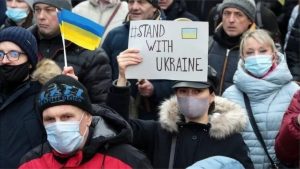A new report from Lloyd’s and Aon says that the sector most affected by Russia’s invasion of Ukraine will be the energy sector.
 The report, Ukraine: A Conflict that Changed the World, lays out five plausible scenarios to the industries and geographies most affected by the conflict. Each scenario explores the possible short, medium, and long-term effects of the war across a series of themes: supply chains, energy, food security, ESG, the climate transition, inflation, and cyber.
The report, Ukraine: A Conflict that Changed the World, lays out five plausible scenarios to the industries and geographies most affected by the conflict. Each scenario explores the possible short, medium, and long-term effects of the war across a series of themes: supply chains, energy, food security, ESG, the climate transition, inflation, and cyber.
John Neal, chief executive officer of Lloyd’s, said: “The conflict in Ukraine has caused devastating human costs and a whole range of interconnected risks across areas like energy, cyber and supply chains. Just take the recent challenges of exporting grain, where geopolitics has in turn affected food security, market volatility and price inflation. A proactive and forward-thinking approach will therefore be key to building resilience against the fallout – and Lloyd’s will deploy its expertise, resources, and risk solutions to support that goal.”
The report looked at the current war by Russia against Ukraine against the prism of four macro themes: geopolitics, inflation, economic impact, and social transformation.
Around geopolitics, Lloyd’s wrote: “This crisis has exposed the vulnerabilities associated with globalisation in an international system in which a powerful state asserts self-interest and breaches international norms and laws. In this new dawn for globalisation, many organisations are likely to adopt hedging strategies to protect their global interests and assets as more protectionist trade policies are introduced. Countries and businesses are pivoting towards reshoring supply chains as a means to achieve self-sufficiency and more control on access to priority goods and services. This reversal of decades of trade and specialisation will inevitably make goods and services more expensive in the long term.”
The inflationary impacts of the crisis, wrote the authors, comes from the supply side price increases that have been seen. These increases will, they wrote, eventually be passed on to consumers.
They added: “Many businesses are likely to adjust their budgets for risk management solutions and reduce discretionary spend to account for inflationary pressures from supply shocks.” While much of the world turned against Russia in the early days of the crisis, Lloyd’s and Aon write that due to its economic size, the country’s blacklisting will have ‘significant economic ramifications’.
They went on: “Whilst the rouble has recovered from an initial shock, any persisting depreciation of the rouble would negatively affect Russia’s ability to boost investment and productivity, damaging global agriculture and manufacturing and creating further risks to food and energy security. Meanwhile, the disruption to critical exports from Ukraine, such as grain, presents a significant and immediate threat to global food security.”
These ramifications, it said, would primarily be felt within Europe and in goods-producing industries like food and energy.
And then Lloyd’s/Aon moved to the social transformation, saying that the Russia’s aggression has caused the fastest refugee flow in Europe since 1945.
It wrote: “Around three million people fled Ukraine in the first three weeks of the crisis and this will continue to grow as the conflict continues. The resulting displacement will contribute to labour shortages and require organisations to reconfigure their labour pools, especially in transport and logistics, to meet the rising demand on products and services.”


